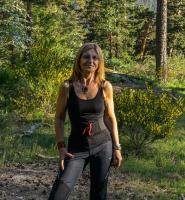Rey Simo Ana
- Investigadora Científica
- Jefe de departamento
- Departamento: Biogeografía y Cambio Global
- Dirección física: Serrano 150bis
- Teléfono: 917452500
- Email: arey@mncn.csic.es
- Página web externa: https://scholar.google.com/citations?user=wVsKAcQAAAAJ&hl=en
- Número ORCID: ORCID.ORG/0000-0003-0394-101X
- Palabras clave:

Investigación
I have been a senior scientist at the Department of Biogeography and Global Change since 2012. Trained as a Plant Ecophysiologist, my expertise include the study of biogeochemical cycles in terrestrial ecosystems and the exchange of greenhouse gases between terrestrial ecosystems and the atmosphere in response to global change.
My main research interest has been to study how human-induced changes are altering the carbon balance of terrestrial ecosystems in order to understand how they will respond to global change drivers. In particular, I have studied the impact of increasing atmospheric CO2 concentration, increased ultraviolet radiation, increasing temperatures and changes in precipitation patterns, or land use changes on forests and terrestrial ecosystems. I have investigated at different temporal (from short to long-term predictions) and spatial scales (local and regional and European scales), and in different biomes (temperate, boreal, tropical, Mediterranean, Antarctic, and drylands).
I was trained as a Plant Ecophysiologist during my Ph.D at Edinburgh University. After that I worked for several years in Edinburgh on several European projects dealing with carbon and nitrogen cycling in European forests. I have also worked as a research scientist in several Universities and International Research Institutions such as Biosphere 2 centre (Columbia University), National Centre for Atmospheric Research (Boulder, Colorado), Stanford University or Davis University as well as in several Italian institutions such as CNR and University of La Tuscia. As a Visiting Expert in FAO, I worked on a project dealing with carbon sequestration strategies in drylands. Recently, I have lead a report on carbon farming in the European forestry sector funded by the European Forest Institute.
After 20 years working abroad, I became a permanent researcher at CSIC in 2007. Since then I have concentrated my research mainly on Mediterranean and arid ecosystems and recently on tropical dry forests trying to understand their response to global change, and their impact on ecosystem functioning with emphasis on soil processes and biodiversity.
Otros investigadores del departamento
- Álvarez Hugo Alejandro
- André Ferreira Mira
- Aragon Carrera Pedro
- Bastos Araújo Miguel
- Bengochea Paz Diego
- Benítez López Ana
- Bravo-Oviedo Andrés
- Camacho Luis
- Cante Bazán Enrique
- Clemente Orta Gemma María
- Diaz Esteban Mario
- Galiana Ibañez Nuria
- Godefroid Martin
- Goicolea Marín Teresa
- Gómez-Vadillo Mónica
- González Cristóbal Marina
- González Trujillo Juan David
- González Ximénez de Embún Miguel
- guim.ursul
- Herrando Pérez Salvador
- Hortal Joaquín
- Jiménez Valverde Alberto
- Martín Portugués Henar
- Martínez Domínguez Paula
- Matias Miguel
- Mendoza Manuel
- Merino Robert Nicolàs
- Miguel Lobo Jorge
- Mingarro López Mario
- R. Pertierra Luis
- Rausell Moreno Armand
- Ronquillo Ferrero Cristina
- Sánchez Albert Adrián
- Tarjuelo Mostajo Rocío
- Vagenas Georgios
- Valladares Ros Fernando
- Wilson Robert J.





